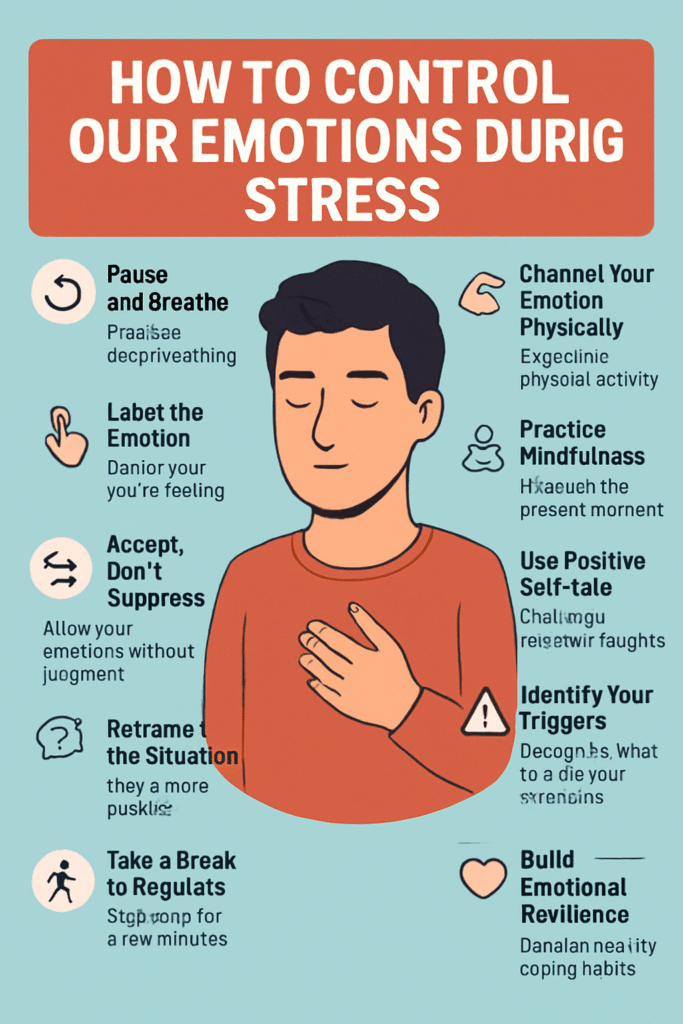Stress is an unavoidable part of life. From daily pressures like deadlines and responsibilities to emotional turbulence in relationships or unexpected crises, stress can make our emotions feel overpowering.
But how we respond to these emotions defines our mental well-being. Controlling emotions during stress isn’t about suppressing them. It’s about understanding, managing, and transforming them.
Let’s explore this process step by step.

Understanding Emotions Under Stress
When we’re under stress, our nervous system gets activated, especially the fight-or-flight response. This is a survival mechanism, but in modern life, it often gets triggered by non-life-threatening situations like traffic jams or work emails.
Stress causes:
- Increased heart rate
- Faster breathing
- Muscle tension
- Emotional reactivity (anger, fear, sadness, irritability)
These emotions are not “bad.” They’re signals. The key lies in listening to them without letting them hijack our behavior.
1.Pause and Breathe Deeply
Why it Works:
Deep breathing sends signals to the brain that it’s safe. It activates the parasympathetic nervous system, which calms the body and reduces the intensity of emotional response.
Try This:
Box Breathing Technique
- Inhale for 4 seconds
- Hold for 4 seconds
- Exhale for 4 seconds
- Hold again for 4 seconds
Repeat this cycle for 3–5 rounds.
2. Label the Emotion
Instead of reacting, name what you’re feeling.
“I’m feeling anxious.”
“I’m really angry right now.”
“This situation is making me feel helpless.”Why it Works:
This is called affect labeling—a technique used in psychology. When we name our feelings, we shift from the emotional part of the brain (amygdala) to the thinking part (prefrontal cortex). This small act reduces emotional intensity.
3. Accept, Don’t Suppress
Trying to “not feel” something makes it worse. Accept your emotion without judgment.
- “It’s okay that I feel this way.”
- “I am allowed to be upset right now.”
- “This is temporary.”
Remember:
Acceptance is not weakness. It’s strength to be with what is, rather than fight it.
4. Reframe the Situation
Stress often comes from the stories we tell ourselves about a situation.
Instead of:
“This is a disaster.”
Try:
“This is tough, but I can handle it.”
“What can I learn from this?”
Cognitive Reframing:
This tool from CBT (Cognitive Behavioral Therapy) helps us replace distorted thinking with realistic, empowering thoughts.
5. Take a Break to Regulate
If the emotion is too overwhelming, step away for a short time.
- Go for a short walk
- Wash your face
- Change your environment
- Listen to calming music
- Stretch your body
This isn’t avoidance, it’s emotional regulation.
6. Channel Your Emotion Physically
Emotions have energy. Stress builds tension. Releasing this energy through movement can be deeply healing.
Try:
- Jogging or walking
- Dancing
- Cleaning or organizing
- Yoga or stretching
Movement helps release cortisol, the stress hormone, and boosts endorphins, the feel-good chemicals.
7. Practice Mindfulness
Mindfulness means being fully present, without judgment.
Try This:
Sit quietly for 5 minutes and focus on:
- Your breath
- The sounds around you
- How your body feels
- What emotions are present—without trying to change them
Regular mindfulness helps reshape your brain to respond calmly to stress over time.
8. Use Positive Self-Talk
Often, stress multiplies because of the way we speak to ourselves.
Replace:
“I can’t do this.”
“I always mess things up.”
With:
“I’m doing my best.”
“I’ve overcome difficult things before.”
“This is just a phase.”
Your inner voice shapes your emotions.
9. Identify Your Triggers
Look for patterns. What situations consistently trigger your stress?
- Deadlines?
- Criticism?
- Social situations?
- Uncertainty?
Once you’re aware, you can prepare or respond more skillfully next time.9. Identify Your Triggers
Look for patterns. What situations consistently trigger your stress?
- Deadlines?
- Criticism?
- Social situations?
- Uncertainty?
Once you’re aware, you can prepare or respond more skillfully next time.
10. Build Emotional Resilience Over Time
Managing emotions during stress is a practice, not a one-time fix.
Build daily habits like:
- Regular exercise
- Quality sleep
- Journaling
- Meditation
- Gratitude practice
- Meaningful conversations
These create a strong emotional foundation so that when stress hits, you don’t collapse.
Final Thoughts: Emotions are Messengers, Not Masters
Your emotions are not your enemy. They’re messengers guiding you toward growth, healing, and self-awareness. The goal is not to eliminate stress, but to respond to it with calm, clarity, and compassion.
Every time you pause, breathe, and respond instead of react—you take a step toward emotional mastery



